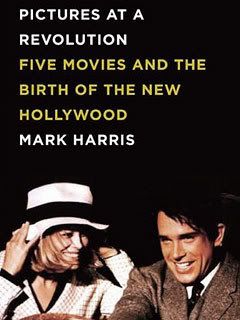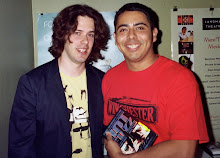
Back when I worked at DVD Planet, there were always discussions about creating a ‘Classics’ section. Customers always wanted to know where our classics were and although we had our AFI Top 100 on one wall, everyone thought we should have a separate area as well. When I was asked how I would classify a classic, I said “Any great movie before 1967.”
“Why 1967?” I was asked.
“That was the year Bonnie and Clyde came out,” I replied.
That film along with a few others, helped to usher in the ‘New Hollywood’ and my favorite era of film, the 70’s. Arthur Penn, Warren Beatty, Faye Dunaway,Robert Towne, Gene Hackman, as well as Mike Nichols, Dustin Hoffman, Conrad Hall, Haskell Wexler, Hal Ashby and many others were all key in making the five movies nominated for Best Picture at the 1967 Academy Awards. The stories of these productions make up Mark Harris’ Pictures At A Revolution: Five Movies and the Birth of the New Hollywood.
The book starts in 1963 with David Newman and Robert Benton coming up with an idea for a movie that would become the screenplay for Bonnie and
For those interested in the any of the films or the stars, the book is certainly an entertaining read. It moves along at a steady pace, bouncing easily between the stories about the mostly harried shoots of all of the movies. None of the films came about easily, although some of them had deeper pockets than others to help them along with the bumps in the road. However, perhaps it’s my overgeeked brain, but for any casual film fan, whom I assume the book was written for, is probably familiar with most of the stories in the book. Whether it’s the beginning of Beatty’s near megalomaniacal producer’s ego or Hoffman direction to book a room as if he were buying condoms, most of the stories here are retreads of
However, where the book got interesting for me was in the story of both of the Poitier films. It was enlightening to read about the constant conflict of color, consciousness, creativity and criticism that circled






2 comments:
I remember those conversations. I agree whole heartedly since the 70s is my favorite time for film, and Bonnie and Clyde started it all. Sounds like a good book I will have to check out. My brother has always said that his favorite actor to work with has been Poitier, simply because of what he stood for but also how incredibly nice and humble he is in person and to see him act up close was incredible. A true legend. I feel like watching a Decade Under the Influence again.
For sure. Sidney hasn't even made a movie in years, presumably since he's been busy standing up to cancer and things like that. All I'm saying is that Morgan Freeman is getting very busy by himself playing all those wise sage roles.
Post a Comment